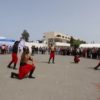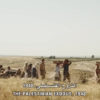Wedding of Galilee
The Wedding of Galilee (1987) is a Palestinian drama film directed by Michel Khleifi. It tells the story of a Palestinian village under Israeli military rule and explores themes of power, resistance, and cultural identity.
Plot Summary
The film revolves around the wedding of a Palestinian couple in a village in Galilee. The village’s elderly mukhtar (leader) wants to organize a grand wedding celebration for his son, but due to Israeli occupation, gatherings of Palestinians are restricted. To obtain permission, the mukhtar makes a controversial decision—he invites the Israeli military governor and his officers to attend the wedding.
As the wedding day unfolds, tensions rise between the Palestinian villagers and the Israeli soldiers, highlighting the deep divisions and struggles of living under occupation. The film portrays the complex emotions of the mukhtar, who tries to maintain dignity while dealing with the humiliation of hosting the occupiers. Meanwhile, the younger generation, including the bride and groom, represents a more defiant stance against oppression.
Themes
- Occupation & Resistance: The film examines how daily life and traditions are affected by Israeli control.
- Generational Conflict: The older generation seeks compromise, while the younger generation leans toward resistance.
- Cultural Identity: The wedding serves as a metaphor for Palestinian resilience and the struggle to maintain traditions despite oppression.
Significance
The Wedding of Galilee was one of the first films to depict Palestinian life under occupation in a nuanced way. It won several international awards and remains an important work in Palestinian and Middle Eastern cinema. The film offers a powerful reflection on dignity, power dynamics, and the ongoing conflict in Palestine.












